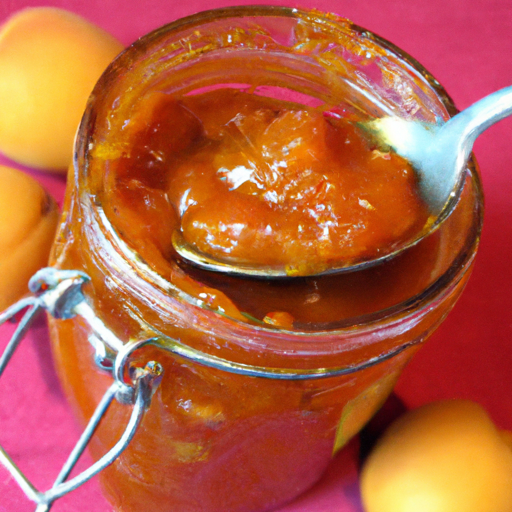Delicious and Healthy: Sugar-Free Apricot Jam
When it comes to fruit spreads, apricot jam stands as a classic favorite. Its vibrant orange hue and delightful taste make it a popular choice for breakfast toasts, pastries, and even savory dishes. For those who prefer to indulge in the sweetness of apricot jam without the added sugar, sugar-free apricot jam is the perfect solution. In this blog post, we will explore the taste, uses, nutritional value, and some interesting facts about this amazing spread.
A Burst of Flavor
Sugar-free apricot jam manages to capture the natural sweetness of ripe apricots without any added sugar. While it may lack the traditional sweetness associated with regular apricot jam, it boasts a distinctive tanginess and robust flavor. The combination of the apricot’s natural acidity and the slight tartness brings a delightful burst of flavor to every spoonful. Whether you spread it on a warm slice of toast or use it as a glaze for roasted meats, this jam will certainly tantalize your taste buds.
Versatile and Creative Uses
Sugar-free apricot jam is incredibly versatile in the kitchen, making it an ideal ingredient for both sweet and savory dishes. Here are some creative ways to incorporate this delicious spread into your culinary adventures:
- Breakfast Delights: Spread it on freshly baked scones, croissants, or toast for a delicious and healthy start to your day.
- Yogurt Parfait: Add a dollop of sugar-free apricot jam to your favorite yogurt and top it off with granola or nuts for a delightful parfait.
- Baking Bliss: Use it as a filling for muffins, cupcakes, or thumbprint cookies to add a burst of flavor.
- Glaze and Marinade: Brush this jam onto grilled or roasted meats like chicken, pork, or lamb to give them a tasty, sweet-yet-tangy glaze.
- Sauce Sensation: Create a flavorful sauce by combining sugar-free apricot jam with some soy sauce, garlic, and ginger – perfect for stir-fries or glazing roasted vegetables.
Nutritional Value and Benefits
Apart from being a delicious treat, sugar-free apricot jam also offers several nutritional benefits. Apricots, the main ingredient in this jam, are rich in vitamins A and C, fiber, and antioxidants. As a result, consuming sugar-free apricot jam can provide your body with essential nutrients while satisfying your sweet cravings. Additionally, the lack of added sugar makes this jam a great choice for individuals looking to reduce their overall sugar intake or managing conditions such as diabetes.
Interesting History and Facts
Apricots have a rich history that dates back thousands of years. The fruit is believed to have originated in China and was later introduced to other parts of the world, including the Mediterranean region. In ancient times, apricots were considered a symbol of good luck, and their trees were grown in royal gardens as a luxurious indulgence. Over time, apricots made their way into the culinary world, with apricot jams becoming a staple in European cuisines.
Conclusion
Sugar-free apricot jam is a delightful and healthier twist on the classic fruit spread. Its tangy flavor, versatility in the kitchen, and nutritional benefits make it an excellent choice for anyone looking to enjoy the taste of apricots without the added sugar. So go ahead, indulge in the sweet-tart goodness of sugar-free apricot jam, and get creative with various ways to incorporate it into your cooking adventures. Your taste buds will thank you!
Sugar-Free Apricot Jam
- Origin: Apricots, the main ingredient of apricot jam, originated in China over 4,000 years ago. The fruit made its way to several countries through trade routes and was later brought to Europe by the Romans.
- Common Uses: Sugar-free apricot jam is widely used as a spread for toast, bagels, and pastries. It can also be used as a filling for cakes, cookies, and tarts. In savory dishes, it can serve as a glaze for roasted meats or a flavorful addition to sauces and dressings.
- Nutritional Benefits: Apricots are rich in essential nutrients. Sugar-free apricot jam, being made from whole fruit, retains some of those nutrients. It is a good source of dietary fiber, vitamin A, vitamin C, and potassium. It contains no added sugars, making it a healthier option for people monitoring their sugar intake.
- Unique Properties: Sugar-free apricot jam has a distinctive sweet and tart flavor that complements a variety of dishes. It is known for its smooth texture, which comes from the natural pectin found in apricots. The absence of added sugars means that it may have a slightly less sweet taste compared to traditional apricot jam.
- Historical Significance: Throughout history, jams and preserves were vital means of preserving fruits for times when fresh fruits were scarce. The practice of making jams can be traced back to ancient civilizations. Sugar was traditionally used to preserve the fruit, but sugar-free options have become popular in recent years due to health concerns and dietary restrictions.




Use the share button below if you liked it.
It makes me smile, when I see it.